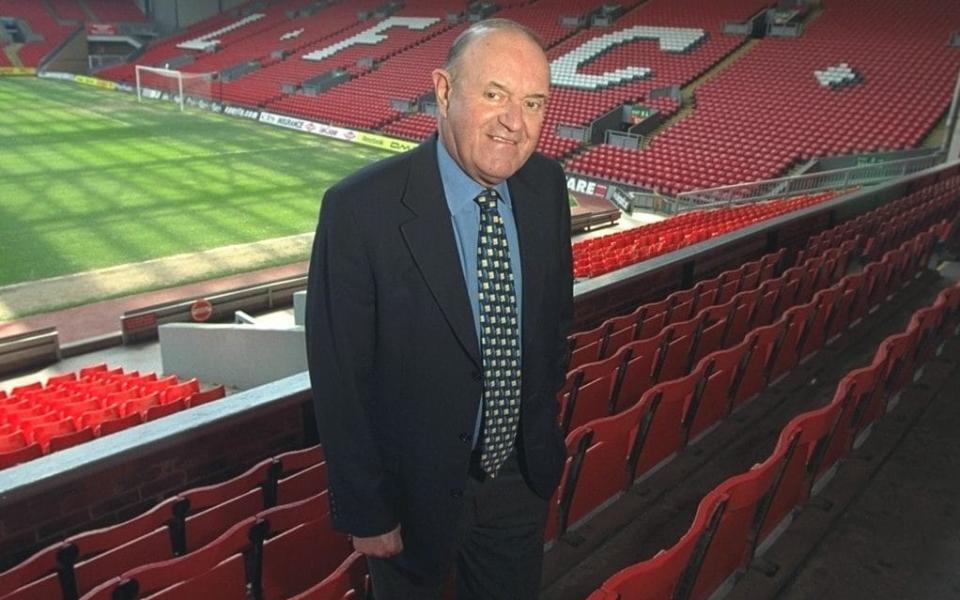Peter Robinson, the administrator who guided Liverpool to glory for three decades, has died aged 86

Peter Robinson, the expert administrator who guided Liverpool Football Club through its triumphs and tragedies for over three decades, has died aged 86.
Robinson joined Liverpool in 1965 at the height of Bill Shankly’s Anfield revolution, becoming the trusted ally of chairmen and managers during the era of seamless progression and success.
Having earlier worked at Stockport County, Crewe Alexandra, Scunthorpe United and Brighton & Hove Albion, Robinson rose from being Liverpool’s club secretary to chief executive before stepping down in 2000 having recently overseen the last significant appointment, that of his friend Gérard Houllier.
For a generation of Kop fans, players and staff, Robinson was the boardroom embodiment of the acclaimed ‘Liverpool way’ which pushed the club to European glory – quietly, and expertly going about his business and willingly allowing the front of house stars to bask in the glory.
He was the shrewdest of negotiators, full of wisdom when guiding critical executive decisions, and pushing through transfer deals – many of which changed the course of Anfield and English football history such as the recruitment of Kevin Keegan, Kenny Dalglish and John Barnes.
Alongside Sir John Smith through the 1970s and 80s, Robinson was pivotal to maintaining the boot room tradition, promoting from within so that Shankly was replaced by Bob Paisley in 1974, and Joe Fagan took over when Paisley stepped down in 1983. As Liverpool continued to win titles and European Cups, those decisions looked like no-brainers. They were far from it given how their rival, Manchester United, were unable to maintain their place at the top in the aftermath of Sir Matt Busby’s retirement.
Among Robinson’s toughest challenges was dealing with the aftermath of the Heysel Stadium disaster in 1985 and Hillsborough in 1989.
Robinson had warned Uefa of the dangers of their choice of venue for the 1985 European Cup final, but he knew the club had to accept the full weight of the punishment imposed following the death of 39 – largely Juventus supporting – spectators.
Liverpool were banned from European competition for the next six years, but when Fagan stepped down in the summer of 1985, Robinson saw the managerial potential of Dalglish and Liverpool won the league and FA Cup double in his first season in charge.

Further horror followed in Sheffield in 1989. Robinson invited thousands of fans into Anfield in the hours which followed the fateful semi-final in which 97 fans lost their lives. The Kop became a floral shrine to those lost, and the Hillsborough families were granted use of the stadium for their annual commemoration ceremonies.
Robinson was a football man of his time, and yet in so many other ways so far ahead of it he makes many of today’s administrators look amateur.
He was responsible for one of English football’s first shirt sponsorship deal – which Liverpool signed with Hitachi in the early 80s – and led the TV revolution as one of the leading executives agreeing the formation of the Premier League in 1992.
In an age before club press officers and Premier League PR departments, there could have been no-one in such a prominent position at one of the world’s biggest football clubs who was so accessible and brilliant at media relations as Robinson.
Every reporter who had the privilege of dealing with him will testify to his intelligence and skill in positioning Liverpool precisely where he wanted them on and off the pitch.
He relished the daily interactions with those on the Merseyside patch. Indeed, if he did not receive his routine call from the Liverpool Echo’s Anfield correspondent before 9am, he would ring the office himself, intuitively understanding the power and importance of the local newspaper.
He was often at his best during the more difficult moments, especially as the club had suffered a relatively barren spell by the late 90s.
Robinson understood Liverpool’s fanbase, and was adept at ensuring some of the most positive stories followed on-field setbacks, a full disclosure of imminent transfer plans often following sobering defeats.
Such interventions were part of his drive to show the club was always looking forward, unwilling to tolerate failure. Every minute he was there, you sensed Liverpool was in safe hands and would reclaim its place at the summit.
It was Robinson’s commander, the chairman Smith, who coined a famous phrase during the club's 70s and 80s heyday.
“At Liverpool we don’t talk. We don’t boast.”
Robinson led Liverpool following that same mantra. To the public he was the most low-profile of men. As an Anfield executive, he was a Titan correctly namechecked in every summary of Liverpool’s golden years.

 Yahoo Sport
Yahoo Sport 





































